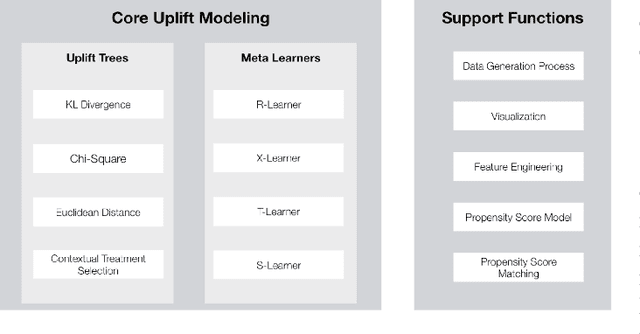Mike Yung
Feature Selection Methods for Uplift Modeling
May 05, 2020



Abstract:Uplift modeling is a predictive modeling technique that estimates the user-level incremental effect of a treatment using machine learning models. It is often used for targeting promotions and advertisements, as well as for the personalization of product offerings. In these applications, there are often hundreds of features available to build such models. Keeping all the features in a model can be costly and inefficient. Feature selection is an essential step in the modeling process for multiple reasons: improving the estimation accuracy by eliminating irrelevant features, accelerating model training and prediction speed, reducing the monitoring and maintenance workload for feature data pipeline, and providing better model interpretation and diagnostics capability. However, feature selection methods for uplift modeling have been rarely discussed in the literature. Although there are various feature selection methods for standard machine learning models, we will demonstrate that those methods are sub-optimal for solving the feature selection problem for uplift modeling. To address this problem, we introduce a set of feature selection methods designed specifically for uplift modeling, including both filter methods and embedded methods. To evaluate the effectiveness of the proposed feature selection methods, we use different uplift models and measure the accuracy of each model with a different number of selected features. We use both synthetic and real data to conduct these experiments. We also implemented the proposed filter methods in an open source Python package (CausalML).
CausalML: Python Package for Causal Machine Learning
Mar 02, 2020
Abstract:CausalML is a Python implementation of algorithms related to causal inference and machine learning. Algorithms combining causal inference and machine learning have been a trending topic in recent years. This package tries to bridge the gap between theoretical work on methodology and practical applications by making a collection of methods in this field available in Python. This paper introduces the key concepts, scope, and use cases of this package.
 Add to Chrome
Add to Chrome Add to Firefox
Add to Firefox Add to Edge
Add to Edge